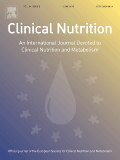
TRACE ELEMENTS AND ELECTROLYTES
metrics 2024
Fostering Innovation in Nutritional Biochemistry
Introduction
TRACE ELEMENTS AND ELECTROLYTES is a prominent academic journal published by DUSTRI-VERLAG DR KARL FEISTLE, focusing on key advancements and research findings in the fields of biochemistry and clinical biochemistry. With an ISSN of 0946-2104, this journal serves as a crucial platform for disseminating knowledge related to the roles of trace elements and electrolytes in biological systems. Although the journal's coverage in Scopus was discontinued in 2016, it maintained a respectable presence during its active years, ranking across various categories, including clinical biochemistry and inorganic chemistry. Researchers and professionals will find that the journal provides valuable insights, aiding in the understanding of micronutrient interactions and their implications for health. By exploring this journal, one can engage with a wealth of historical data and research narratives that are instrumental in the ongoing discourse in the biological sciences.
Metrics 2024
 -
- 0.10
0.10 0.20
0.20 -
-Metrics History
Rank 2024
Scopus
IF (Web Of Science)
JCI (Web Of Science)
Quartile History
Similar Journals

BIOFACTORS
Transforming Biological Insights into Clinical SolutionsBIOFACTORS, an esteemed journal published by Wiley, serves as a pivotal resource in the fields of Biochemistry, Clinical Biochemistry, and Molecular Medicine. With ISSN 0951-6433 and E-ISSN 1872-8081, the journal has established its reputation since its inception in 1988, showcasing a rich history of scientific inquiry and innovation. Recognized for its high academic standards, it currently holds a Q1 ranking in key categories, including Biochemistry and Medicine (miscellaneous), and ranks in the top 10% for Clinical Biochemistry according to Scopus metrics, reflecting its impact and influence in the scientific community. Although it does not offer Open Access, BIOFACTORS provides researchers the opportunity to publish and disseminate high-quality studies that advance our understanding of biological factors and their clinical implications. The journal actively encourages contributions that bridge the gap between laboratory findings and clinical applications, making it a vital platform for both seasoned researchers and emerging scholars in the life sciences.

CLINICAL NUTRITION
Connecting Clinicians and Researchers for Optimal Nutrition SolutionsCLINICAL NUTRITION, published by Churchill Livingstone, is a premier international journal dedicated to advancing the field of nutrition and dietetics, as well as critical care and intensive care medicine. Established in 1982, the journal has consistently delivered high-quality, peer-reviewed research, celebrated for its impact with an impressive Q1 ranking in both Critical Care and Intensive Care Medicine and Nutrition and Dietetics categories as of 2023. With its emphasis on collaborative discourse among researchers, clinicians, and educators, CLINICAL NUTRITION plays a crucial role in shaping dietary practices and interventions that enhance patient care and recovery. Although the journal does not provide open access, its rigorously curated content remains a vital resource for professionals seeking to implement evidence-based nutrition strategies in clinical settings. The journal is situated in the United States, with operations based out of Edinburgh, Scotland. Researchers are encouraged to engage with this influential publication to stay abreast of the latest findings and innovations within these intersecting fields.

Journal of Nutritional Science
Promoting open access to vital nutrition research.The Journal of Nutritional Science, published by Cambridge University Press, is a leading open-access journal dedicated to the field of nutrition and dietary research. Established in 2012, this journal aims to disseminate high-quality research on nutrition, dietetics, and their implications for health and disease. With an impact factor reflective of its growing importance—holding Q2 and Q3 rankings in relevant categories such as Nutrition and Dietetics and Endocrinology—the journal serves as a vital platform for researchers, professionals, and students interested in evidence-based advancements within the nutritional sciences. The Journal of Nutritional Science is based in the United Kingdom and leverages a global network of experts to foster discussions that drive innovation in food science and health policies. By enabling open access to its content, it ensures that critical knowledge is readily available to the academic community and beyond, promoting a healthier, more informed society.

Journal of Nutrition and Metabolism
Advancing the Science of Nutrition and MetabolismJournal of Nutrition and Metabolism, published by HINDAWI LTD, is a prominent peer-reviewed, open-access journal that has been serving the scientific community since 2010. Based in Egypt, this journal is dedicated to advancing the field of nutrition and metabolism, providing a platform for innovative research that spans endocrinology, diabetes, food science, and dietetics. With a consistent commitment to accessibility, it embraces open-access policies to facilitate wider dissemination of knowledge, ensuring that researchers, professionals, and students can freely engage with pivotal studies and findings. The journal is currently indexed with an impressive standing in various categories, including being positioned in Q2 in Food Science and Q3 in Endocrinology, Diabetes and Metabolism. Furthermore, it ranks among the top journals in its fields on Scopus, reflecting its significance and impact within the research community. With a focus on robust, evidence-based studies that inform dietary practices and metabolic health, the Journal of Nutrition and Metabolism plays a crucial role in addressing the challenges of modern nutrition.

JOURNAL OF PHYSIOLOGY AND BIOCHEMISTRY
Empowering Scholars to Shape the Future of Health SciencesJOURNAL OF PHYSIOLOGY AND BIOCHEMISTRY, published by Springer in the Netherlands, serves as a pivotal platform for disseminating high-quality research within the fields of physiology, biochemistry, and related biomedical sciences. With an impressive impact factor reflected in its categorization as Q2 in Biochemistry and Q1 in Medicine (miscellaneous), this journal fosters a vibrant community of scholars dedicated to advancing knowledge and innovation. The journal’s broad scope encompasses a wide range of topics from cellular mechanisms to systemic physiology, making it relevant for both theoretical and applied sciences. Researchers and practitioners are encouraged to utilize the available Open Access options to reach a wider audience. The journal’s continuous contribution to the scientific dialogue since its inception in 1996 positions it as a key resource for professionals and students alike, facilitating the exploration of cutting-edge topics and collaborative research opportunities.

BIOLOGICAL TRACE ELEMENT RESEARCH
Pioneering Insights into the World of Trace ElementsBIOLOGICAL TRACE ELEMENT RESEARCH, published by SpringerNature, is a prestigious academic journal dedicated to advancing the understanding of trace elements and their critical roles in biological systems. With an impressive range of quartile rankings across multiple disciplines—including Q1 in Inorganic Chemistry and Q2 across various medical and biochemical categories—this journal stands out in its field. Since its inception in 1979, it has provided a vital platform for researchers worldwide to disseminate innovative findings that enhance our knowledge of trace elements in relation to health, environment, and medicine. The journal’s impact is reflected in its notable Scopus rankings, positioning it within the top echelons of biochemistry and medicine. Although primarily a subscription-based publication, it remains an essential resource for professionals, educators, and students alike, seeking to deepen their understanding of the complexities associated with trace elements.

HORMONE AND METABOLIC RESEARCH
Illuminating the Science of Hormones and MetabolismHORMONE AND METABOLIC RESEARCH, published by GEORG THIEME VERLAG KG, stands as a reputable platform in the fields of biochemistry, endocrinology, and metabolism since its establishment in 1969. This peer-reviewed journal provides critical insights and advancements in the intricate relationships between hormones and metabolic processes, catering to researchers, healthcare professionals, and students alike. With an impressive convergence of knowledge spanning over five decades, it maintains a commendable Q3 ranking in multiple categories, including Biochemistry, Clinical Biochemistry, and Endocrinology, highlighting its contribution to cutting-edge scientific discourse. Although not an open-access journal, it offers a plethora of access options for readers and institutions, ensuring that vital research reaches those who need it most. Located in Stuttgart, Germany, the journal is positioned at the forefront of influential research in hormone and metabolic studies, emphasizing its importance for ongoing investigations into health and disease.

Journal of the American Nutrition Association
Empowering Research, Transforming NutritionJournal of the American Nutrition Association is a premier scholarly outlet dedicated to advancing the field of nutrition science. Published by ROUTLEDGE JOURNALS, TAYLOR & FRANCIS LTD, this journal aims to disseminate high-quality research that addresses the complexities of diet, health, and nutrition in various populations. With a robust impact factor demonstrating its significance in the realm of Medicine and Nutrition, it holds notable ranks in both the Medicine (miscellaneous) and Nutrition and Dietetics categories within Scopus. The journal supports a vision of expanding access to vital nutrition research through its open-access options, enhancing the visibility and impact of published works. As it continues to evolve from 2022 to 2024, the Journal of the American Nutrition Association stands as an invaluable resource for researchers, health professionals, and students keen on contributing to and staying informed about the latest advancements in nutrition science.

JOURNAL OF TRACE ELEMENTS IN MEDICINE AND BIOLOGY
Advancing Knowledge on Trace Elements in Medicine and BiologyThe JOURNAL OF TRACE ELEMENTS IN MEDICINE AND BIOLOGY, published by Elsevier GmbH, stands as a leading platform for disseminating pivotal research in the interdisciplinary field that bridges biochemistry, inorganic chemistry, and molecular medicine. With an impact factor reflective of its high-quality submissions and significant contribution to the scientific community, this journal currently holds a Q2 ranking in Biochemistry and a Q1 ranking in Inorganic Chemistry, underlining its esteemed status among peers. Since its inception in 1995 and continuing through to 2024, the journal has fostered a dynamic discourse on the fundamental roles of trace elements in biological systems, incorporating studies that range from their biochemical functions to their impact on health and disease. Researchers, professionals, and students alike can access a wealth of knowledge, missing Open Access options notwithstanding, making it indispensable for those at the forefront of scientific investigation in medicine and biology.

NUTRITION RESEARCH
Exploring Innovative Solutions for Nutritional ChallengesNUTRITION RESEARCH, published by PERGAMON-ELSEVIER SCIENCE LTD, stands as a pivotal platform for the dissemination of groundbreaking research in the fields of nutrition, dietetics, and endocrinology. With an established track record since 1981, the journal has successfully converged its academic purview into 2024, providing a continuous source of high-impact studies that address critical issues in human health and nutrition. Recognized as a Q2 journal in multiple relevant categories, including Endocrinology and Nutrition, as well as boasting respectable Scopus rankings, it serves a diverse audience of researchers, professionals, and students eager to enhance their understanding of nutritional science. Although the journal does not operate on an open access model, its contributions are invaluable, fostering advancements and collaboration within the scientific community dedicated to improving dietary practices and outcomes. The current address of the journal is THE BOULEVARD, LANGFORD LANE, KIDLINGTON, OXFORD OX5 1GB, ENGLAND, positioning it at the heart of global research initiatives.